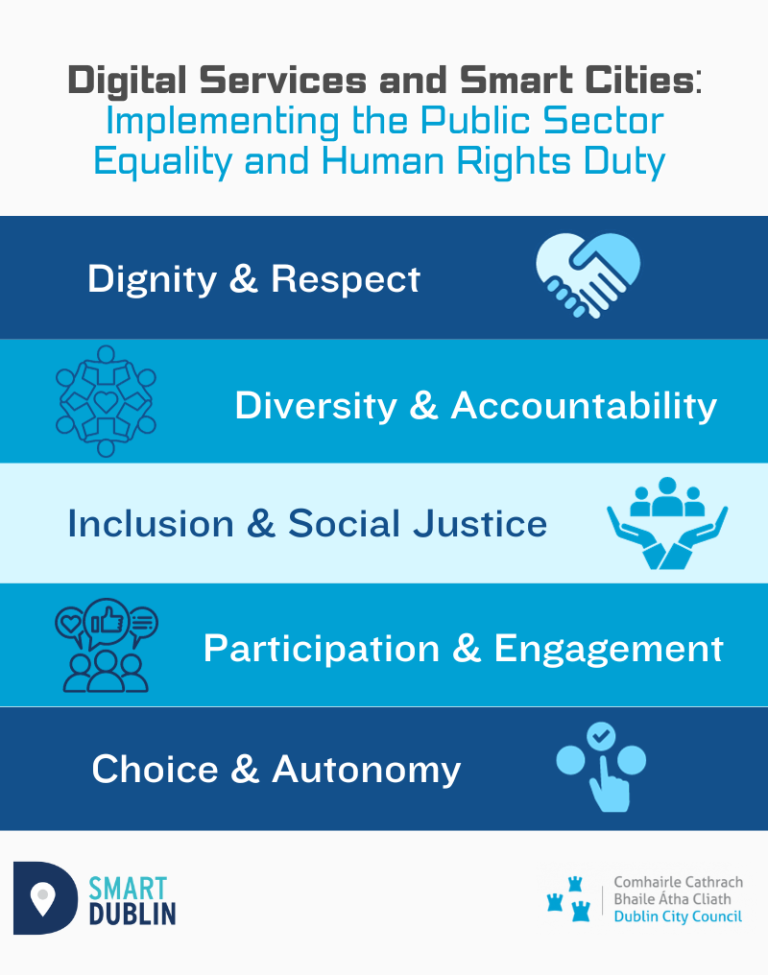Dublin City Council’s Smart Cities Unit and the Digital Services team have developed one of the first implementation plans for mainstreaming human rights through the delivery and use of digital services in Dublin. Working with nationally recognised Equality and Human Rights Expert Niall Crowley, the Smart Cities Unit and Digital Services teams analysed the Irish Public Sector Equality and Human Rights Duty and created an evidence book to support the upholding of digital human rights in the public sector.
The existing Irish Public Sector Equality and Human Rights Duty spells out three main goals for all public bodies in Ireland:
- Eliminate discrimination
- Promote equality of opportunity and treatment of its staff and the persons to whom it provides services
- Protect the human rights [digital rights] of its members, staff and the persons to whom it provides services

The world is at a critical moment in regard to the mainstreaming of digital technologies in both the public and private sectors and the future implications of what these technologies mean for citizens. As cities accelerate digitally, it is more important than ever to be conscious of rapidly changing solutions that are being deployed.
In this digital age, within the larger umbrella of human rights, digital rights are the human rights that exist online as well as offline. This directly correlates to the standard laid out in the Irish Public Sector Equality and Human Rights Duty to uphold human rights, promote equality, and eliminate discrimination in public bodies in Ireland.
This ongoing work that has been done engaging with the Irish Public Sector Equality and Human Rights Duty sets the standard to uphold human rights in the digital sector nationwide across Ireland. It is crucial that the employee’s digital rights are embedded in their onboarding training and reinforced in their role when using and procuring digital solutions.
Each of the five equality and human rights value statements are key focus areas to use when examining and deciding to deploy digital services in Dublin. The value statements are: Dignity & Respect, Diversity & Accountability, Inclusion & Social Justice, Participation & Engagement, and Choice & Autonomy.
Many of us use digital services on a daily basis – from accessing the Internet from a mobile device, travelling through traffic intersections, and paying for goods or services. However, gaps in access to devices such as computers or tablets are also evident. For example, people from a lower socio-economic level are more likely to own older and second-hand devices, to have internet access only on their smartphone, and to have limits on the amount of data they can use.
In recent years, there has been a shift of office work to being remote work from home. When organisations assume that any employee has the technical digital skills and digital infrastructure to connect to a job remotely and be able to access all of the services and content online, they are potentially exacerbating the digital divide. This would fall under the Inclusion & Social Justice value statement, because normalising these actions could normalise the digital divide between people of different socio-economic levels.
Especially across lower socio-economic levels and across demographic divides – this digital divide is evident. Those who are unemployed, those with lower education, lone-parent households, and the lower income quintiles are less likely to own ICT devices, use computer software, download apps, use internet banking, or interact with the government online.
Taking a global angle to this work, Dublin has been involved with the Cities Coalition for Digital Rights. Since 2018, Dublin has participated and supported the work of the Cities Coalition for Digital Rights. Dublin committed to upholding and mainstreaming digital rights in the public sector by being a part of the Digital Rights Governance Framework pilot project and now continuing forward as a leadership city in the Coalition.
Further information will be provided about the Irish Public Sector Equality and Human Rights Duty and the topic of digital human rights through ‘Digital Rights’ workshops facilitated through Academy of the Near Future, which is the Smart Docklands engagement programme for young people and local authority staff. These workshops will help to build staff awareness of the requirements of the Duty, the equality and human rights issues relevant to digital services and the implementation plan for the Duty.
While the Smart Cities Unit and Digital Services teams at Dublin City Council were one of the first departments to create an implementation plan for the Irish Public Sector Equality and Human Rights Duty; this is expected to scale across Dublin City Council, before spreading to local authorities across Ireland. To continually assess, address, and report digital human rights issues, the Duty must be treated as an ongoing obligation for all public bodies. The Public Sector Equality and Human Rights Duty Implementation Plan can be found here.
